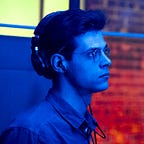Hubris happens before our eyes
JULY 5TH, 2016 — POST 183
Last Friday, July 1st, saw the opening of a new Tesla showroom in Sydney. On the once-banks-now-more-fashion pedestrian mall that is Martin Place — a central thoroughfare in Sydney’s CBD — three Tesla Model Ses sit on white tiles behind glass doors. The store’s wreathed with clothing and samples of the different leathers you can install on the Model S’s headliner. The store seems more hearts-and-minds than actually moving units. Those 3 cars — white, red, and grey — are impeccable mascots. And going by recent reporting by Quartz, I’m guessing Tesla might be wanting them back.
Tesla announced to investors that it missed its delivery targets for the April-June period: they shipped 14,370 of their promised 17,000 vehicles. Those who have even a passing interest in following the electric car upstart would know that this was not only unsurprising but what we’ve come to expect. Tesla’s CEO Elon Musk — possibly the world’s most visionary technologist — has been called out regularly for his penchant for over-ambitious targets in his ventures, Tesla and SpaceX most notably. And whilst we’re talking about a company here, made up of a bunch of high-performance decision makers, it’s hard to parse this news without throwing it back on Musk himself.
Even if missing delivery targets can shake investor confidence, Musk is facing a greater public relations challenge in the wake of a fatal crash, a driver who was using his Tesla’s autopilot system. As much as Musk and others involved in autonomous driving are legitimately creating a safer automotive future, for the public any deaths are too many. Most people would rather die at their own hands more frequently than die just once at the hands of machine. And with the company staring down the most aggressive production and release schedule to meet release dates for the Model 3, announced at a competitive USD$35,000, that will see hundreds of thousands — all of which have already been preordered for a fee of USD$1000 — needing to be produced. And quick.
“Man’s reach exceeds his grasp”. So says Nikola Tesla in Christopher Nolan’s The Prestige. But the David Bowie-played incarnation of the 19th Century pioneer dismisses this idiom as incorrect, or more specifically:
“It’s a lie. Man’s grasp exceeds his nerve.”
It should seem pretty natural to turn to Nolan’s oeuvre for a dramatic analysis of hubris, few moments so cleanly capturing the drive the Nolan’s protagonists embody. And in the case of Musk, Bowie-Tesla’s version would seem to ring true. As the Quartz story reports, Tesla’s share price has dropped recently, indicating that some investors just don’t have the nerve to support Musk’s grasp.
I have a hunch that if we take 2016 as the middle of a decade-long period, this “decade” will be viewed from posterity as a definitive statement on the reach-grasp-nerve of Musk and those around him. Musk consistently seems to be walking on the blade of a sword — between moon-shoot idealism and delivering products. He’s seemingly single-handedly taken on the responsibility of being the poster boy for a new world: almost a walking talking World’s Fair of yesteryear. Not only is it his intention to disrupt to the point of forcing change in electric vehicles, but Tesla’s battery tech is moving into homes, and hopefully into industry. He’s building a “gigafactory”, what will be the biggest building in the world, to build the Model 3. He’s got a space tech business that he hopes will be NASA’s go-to guys for frequent launches. He’s waiting watch whilst someone tries to build a Hyperloop, based of plans Musk made then made public, but will probably just do it himself if they fail. And he’s probably going to die on Mars.
It’s hard not to descend into cynical glibness when talking about what Musk is attempting because by all objective measures just one of these things would be historical. Practical concerns like “product delivery” just seem to necessary inconveniences. But for the most part, it’s just up in the air. Who knows if he actually can pull this off? It is worth considering, however, how stacked the decks are against him. What this autopilot death has shown is that no matter how hard you push, your efforts can be undercut by a simply bad image. One death is unlikely to more than glance off Tesla, but if next time it’s a Hyperloop full of VCs or an off-Earth mission, those optics might be enough to destroy Musk’s future.
The character of Nikola Tesla in The Prestige concludes his speech by conceding:
“The first time I changed the world I was hailed as a visionary. The second time I was asked politely to retire. The world only tolerates one change at a time.”
If this line is born out of anything truer than Nolan’s own hubris, Musk has his biggest challenges still to come. Because changing the world just once is nearly impossible. This guy wants to do it once a quarter.
Only the best stuff. In your inbox each week.
Sign up for one email per week with the best of the week before (and sometimes a little more).
